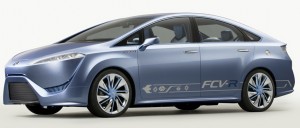Nearly seven months after announcing an expansion to their alliance, Toyota and BMW appear ready to announce the first fruits of their partnership.
According to published reports, Toyota is close to inking an agreement to license its fuel cell vehicle technology to BMW. Official word on the agreement could come as early as Thursday.
BMW plans to build a prototype vehicle using the technology by 2015 with production possible by about 2020.
The fuel cell project is just the first fruits of what the automakers plan as a multi-project partnership.
Rival automakers including General Motors, Daimler, Nissan and Hyundai are also working on fuel cell technology.
Toyota will provide BMW with fuel cell and hydrogen storage technology.
Fuel cells convert a fuel, typically hydrogen into electricity to power a vehicle. Fuel cells have advantages over battery electric vehicles because they can travel further and can easily be refueled in a matter of minutes, while battery electrics require hours to charge fully.
Many experts believe that automakers will need to have access to variety of types of advanced powertrain technologies such as fuel cells as automakers try to wean motorists off of petroleum fuels. So automakers haven’t developed those technologies are seeking partnerships with those that have developed it. BMW has focused its efforts on developing battery electric vehicles as well as light-weighting technologies including carbon fiber.
For Toyota’s part, building technology partnerships gives it the opportunity access more customers, spreading out the costs of developing the new technologies.
When announced in June, Toyota and BMW envisioned a wide-ranging sharing of technology. Plans call for the two to collaborate on lithium ion battery development and for BMW to supply Toyota with diesel engines. BMW has sought multiple partners to supply engines, where it is considered an industry leader.
In June, the automakers announced plans that focused on four key areas:
- The joint development of a hydrogen fuel-cell system;
- Joint development of the architecture – or platform – as well as components for a future sports car;
- Collaboration on powertrain electrification;
- Joint R&D on lightweight materials, such as carbon fiber.
No more details about the sports car project have been announced, but the project has drawn significant interest, as sports cars typically do. Toyota recently partnered with Subaru on the joint development of their shared budget-priced sports car sold as the Subaru BRZ and Scion FR-S in the U.S.
As one of the world’s leading luxury brands, BMW offers a number of high-end sports cars and sports sedans.
Click here to read more about the Toyota-BMW partnership.


I hope that fuel cell technology works out to be viable and safe. It could be the future but we’ll need to wait and see. In the meantime clean Diesels are the way to lower emissions and good mpg, not ignorant CAFE standards forced on car makers that will raise the cost of new vehciles $3,000 or more per year and still be unable to meet the absurd 54.5 mpg requirements.
Per my note to a separate comment you made, agreed on diesels. I am not as down on 54.5 mpg as you. I am glad there will be a review point should the industry simply be threatened with going off the rails…but I think we’re going to find that, as with every previous CAFE increase, the makers will do surprisingly better than many had originally feared.
Paul E.